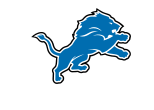
| Detroit Lions | |||
| Current season | |||
|
Established 1929 Play in Ford Field Detroit, Michigan Headquartered in Allen Park, Michigan |
|||
|
|||
| League/conference affiliations | |||
|
National Football League (1930–present) Western Division (1933–1949) National Conference (1950–1952) Western Conference (1953–1969) Central Division (1967–1969) National Football Conference (1970–present) NFC Central (1970–2001) NFC North (2002–present) |
|||
| Current uniform | |||
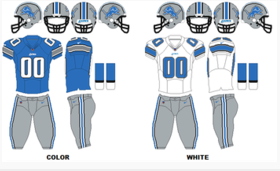 |
|||
| Team colors |
Honolulu Blue, Silver, Black, White |
||
| Fight song | Gridiron Heroes | ||
| Mascot |
Roary the Lion Theo "Gridiron" Spight (fight song singer) |
||
| Personnel | |||
| Owner(s) | William Clay Ford, Sr. | ||
| Chairman | William Clay Ford, Sr. | ||
| President | Tom Lewand | ||
| General manager | Martin Mayhew | ||
| Head coach | Jim Schwartz | ||
| Team history | |||
|
Portsmouth Spartans (1929–1933) Detroit Lions (1934–present) |
|||
| Championships | |||
|
League championships (4) NFL Championships (pre-1970 AFL–NFL merger) (4) 1935, 1952, 1953, 1957 |
|||
|
Conference championships (4) NFL National: 1952 NFL Western: 1953, 1954, 1957 |
|||
|
Division championships (4) NFL West: 1935 NFC Central: 1983, 1991, 1993 |
|||
| Playoff appearances (15) | |||
| NFL: 1935, 1952, 1953, 1954, 1957, 1970, 1982, 1983, 1991, 1993, 1994, 1995, 1997, 1999, 2011 | |||
| Home fields | |||
|
Universal Stadium (1930–1933) University of Detroit Stadium (1934–1937, 1940) Tiger Stadium (1938–1939, 1941–1974) a.k.a. Briggs Stadium (1938–1960) Pontiac Silverdome (1975–2001) Ford Field (2002–present) |
|||
The Detroit Lions are a professional American football team based in Detroit, Michigan. They are members of the North Division of the National Football Conference (NFC) in the National Football League (NFL), and play their home games at Ford Field in Downtown Detroit.
Originally based in Portsmouth, Ohio and called the Portsmouth Spartans, the team began play in 1929 as an independent professional team,[1] one of many such teams in the Ohio and Scioto Rivervalleys. For the 1930 season, the Spartans formally joined the NFL as the other area independents folded because of the Great Depression. Despite success within the NFL, they could not survive in Portsmouth, then the NFL's smallest city. The team was purchased and moved to Detroit for the 1934 season.
The Lions have won four NFL Championships, the last in 1957, giving the club the second-longest NFL championship drought behind the Arizona Cardinals. The Lions have not had much success during the Super Bowl era: the Lions are one of four current NFL teams that have yet to qualify for the Super Bowl, and the team is 1–10 in post-season play during that period. The 2008 team became the only team in NFL history to lose all 16 regular season games since the NFL went to a 16-game schedule in 1978.
Franchise history
Main article: History of the Detroit Lions
See also: List of Detroit Lions seasons
Logos and uniforms
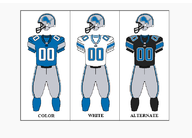
Detroit Lions uniform: 2003–2008
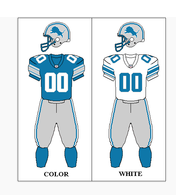
Detroit Lions uniform: 1999–2002
Aside from a brief change to maroon in 1948 instituted by then head coach Bo McMillin (influenced by his years as coach at Indiana), the Lions uniforms have basically remained the same since the team debuted in 1930. The design consists of silver helmets, silver pants, and either blue or white jerseys.
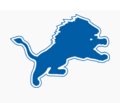
Lions logo (1970–2002). A variation of this logo with a black border was used until the 2009 NFL season, when the current logo was implemented.
There have been minor changes to the uniform design throughout the years, such as changing the silver stripe patterns on the jersey sleeves, and changing the colors of the jersey numbers. White trim was added to the logo in 1970. In 1998, the team wore blue pants with their white jerseys along with grey socks but dropped that combination after the season. In 1999, the 'TV numbers' on the sleeves were moved to the shoulders.
The shade of blue used for Lions uniforms and logos is officially known as "Honolulu blue," which is supposedly inspired by the color of the waves off the coast of Hawaii. The shade was chosen by CyHuston, the Lions first vice president and general manager, and of the choice, he said: "They had me looking at so many blues I am blue in the face," Huston said about the selection. "But anyway, it's the kind of blue, I am told, that will match with silver."
In 1994, every NFL team wore throwback jerseys, and the Lions' were similar to the jerseys used during their 1935 championship season. The helmets and pants were solid silver, the jerseys Honolulu blue with silver numbers and the jersey did not have 'TV numbers' on the sleeves. The team wore solid blue socks along with black shoes. The helmets also did not have a logo, as helmets were simple leather back then. The Lions also wore '50s-style jerseys during their traditional Thanksgiving Day games from 2001 to 2004 as the NFL encouraged teams to wear throwback jerseys on Thanksgiving Day.
In 2003, the team added black trim to their logo and the jerseys. The face masks on the helmet changed from blue to black with the introduction of the new color. Additionally, an alternate home field jersey which makes black the dominant color (in place of Honolulu Blue) was introduced in 2005.
For 2008, the team dropped the black alternate jerseys in favor of a throwback uniform to commemorate the franchise's 75th anniversary. The throwback uniform became the team's permanent alternate jersey in 2009, replacing the former black alternate.[2] The Lions officially unveiled new logo designs and uniforms on April 20, 2009. The Lion on the helmet now has a flowing mane and fangs, and the typeface of "Lions" is more modern.
Home attendance
|
||||||||||||||||||||||||||||||||||||||||
Retired numbers
| Detroit Lions retired numbers | |||
|---|---|---|---|
| N° | Player | Position | Tenure |
| 7 | Dutch Clark | QB | 1934–38 |
| 20 | Barry Sanders | RB | 1989–98 |
| 22 | Bobby Layne | QB, K | 1950–58 |
| 37 | Doak Walker | HB, K, P | 1950-55 |
| 56 | Joe Schmidt | LB | 1953–65 |
| 85 | Chuck Hughes 1 | WR | 1970–71 |
Notes:
• 1 Posthumous.
• The #20 was retired specifically for Sanders, even though the retired number was also worn by RB Billy Sims and DB Lem Barney, both of whom are also among the top all-time Lions at their positions.
• The No. 56 was unretired with Schmidt's blessing when the Lions acquired linebacker Pat Swilling from the Saints. No player has worn it since Swilling left.
• Hughes died of a heart attack during a game on October 24, 1971, and his No. 85 was withdrawn from circulation. However, WR Kevin Johnson wore No. 85 during his stint in Detroit after asking permission from the Hughes family as he had worn that number throughout his professional career.
Special cases:
• The Lions retired #93 for the 2009 season after Corey Smith disappeared, presumed dead, when a boat he was fishing in with friends capsized off the Florida coast.[4] The Lions also wore 93 stickers on their helmets that season. Number 93 was assigned to Kyle Vanden Bosch in 2010.
Pro Football Hall of Famers
• 20 Lem Barney, DB (1992)
• 76 Lou Creekmur, G/T (1996)
• 14 Jack Christiansen, DB (1970)
• 7 Dutch Clark, QB (1963)
• 35 Bill Dudley, HB (1966)
• 72 Frank Gatski, C (1985)
• 35 John Henry Johnson, FB (1987)
• 81 Dick "Night Train" Lane, DB (1974)
• 28 Yale Lary, DB, P (1979)
• 22 Bobby Layne, QB (1967)
• 44 Dick LeBeau, DB (2010)
• 20 Barry Sanders, RB (2004)
• 88 Charlie Sanders, TE (2007)
• 56 Joe Schmidt, LB (1973)
• 37 Doak Walker, HB (1986)
• 50 Alex Wojciechowicz, C, LB (1968)
Divisions and division rivals
Main article: NFL Western Conference
The Lions have been a part of multiple divisions and have had several division rivals in their existence. Their oldest rivals are the Chicago Bears and the Green Bay Packers, whom they have been paired with in a division since 1933. The Minnesota Vikings have been in a division with Detroit ever since their inaugural season in 1961.
NFL Western Division: 1933–1949
• Chicago Bears (1933–1949)
• Chicago Cardinals (1933–1949)
• Cincinnati Reds (1933–1934, suspended the final 3 games of 1934 for failing to pay league dues)
• Cleveland / Los Angeles Rams (1933–1949, suspended play in 1943)
• Portsmouth Spartans / Detroit Lions (1933–1949)
• Green Bay Packers (1933–1949)
• St. Louis Gunners (1934, the final 3 games only as a replacement for the suspended Cincinnati Reds)
• Card-Pitt (1944, the combined Chicago Cardinals and Pittsburgh Steelers team)
NFL National Conference: 1950–1952
• Baltimore Colts (1950)
• Chicago Bears (1950–1952)
• Detroit Lions (1950–1952)
• Green Bay Packers (1950–1952)
• Los Angeles Rams (1950–1952)
• New York Yanks (1950–1951) / Dallas Texans (1952) (moved from New York to Dallas before folding, not to be confused with these Dallas Texans)
• San Francisco 49ers (1950–1952)
NFL Western Conference: 1953–1966
• Baltimore Colts (1953–1966)
• Chicago Bears (1953–1966)
• Detroit Lions (1953–1966)
• Green Bay Packers (1953–1966)
• Los Angeles Rams (1953–1966)
• San Francisco 49ers (1953–1966)
• Dallas Cowboys (1960)
• Minnesota Vikings (1961–1966)
NFL Central Division: 1967–1969
• Chicago Bears (1967–1969)
• Detroit Lions (1967–1969)
• Green Bay Packers (1967–1969)
• Minnesota Vikings (1967–1969)
NFC Central: 1970–2001
• Chicago Bears (1970–2001)
• Detroit Lions (1970–2001)
• Green Bay Packers (1970–2001)
• Minnesota Vikings (1970–2001)
• Tampa Bay Buccaneers (1977–2001)
NFC North: 2002 – present
• Chicago Bears (2002 – present)
• Detroit Lions (2002 – present)
• Green Bay Packers (2002 – present)
• Minnesota Vikings (2002 – present)
Radio and television
Main article: List of Detroit Lions broadcasters
Radio
Main article: Detroit Lions Radio Network
The Lions' flagship radio stations are WXYT-FM, 97.1 FM, and WXYT-AM, 1270 AM. Dan Miller does play-by-play, Jim Brandstatter does color commentary, and Tony Ortiz provides sideline reports.[5] If a conflict with Detroit Tigers or Detroit Red Wings coverage arises, only WXYT-FM serves as the Lions' flagship. The Lions and WXYT AM/FM renewed their partnership for three more seasons on October 9, 2009.[6]
TV
Preseason
Main article: Detroit Lions Television Network
WXYZ-TV is the flagship station Lions preseason games.[7] The announcers are Matt Shepard with play-by-play, Rob Rubick with color commentary, and Tom Leyden with sideline reports.
Regular season
Regular season games are broadcast regionally on Fox, except when the Lions play an AFC team in Detroit, in which case the game airs regionally on CBS. The Thanksgiving Classic game in Detroit is always televised nationally on either Fox or CBS, depending on who the visiting team is. The Detroit Lions are the last NFC team to play on NBC, since they got football back in 2006 (the Lions at Saints game on December 4, 2011 will mark their 1st appearance). The Lions' official regular season pregame show is The Ford Lions Report.
Blackouts
The Lions' winless performance in 2008 and 2–14 season in 2009, coupled with the effects of the late-2000s recession in Michigan, led to several local broadcast blackouts, as local fans did not purchase enough tickets by the 72-hour blackout deadline. In 2008, five of the Lions' final six home games of the season did not sell out, with the Thanksgiving game being the exception. The first blackout in the seven-year history of Ford Field was on October 26, 2008, against the Washington Redskins. The previous 50 regular season home games had been sellouts. The second home game of the 2009 season in which the Lions broke the losing streak (also against the Washington Redskins) was blacked out locally, as well as the comeback victory over the Cleveland Browns. The Lions had only one blackout in 2010, the Washington Redskins game,[8] which the Lions won 37–25.
Games were also often blacked out at the Lions' previous home, the (perhaps over-sized) 80,000-seat Pontiac Silverdome, despite winning seasons and the success and popularity of star players such as Barry Sanders.


